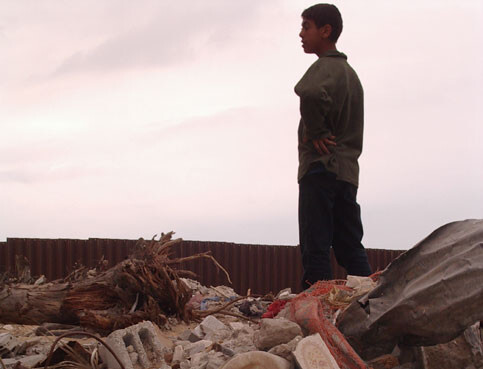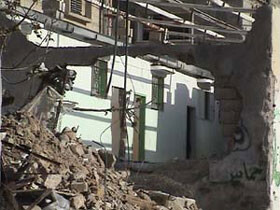Rafah, Gaza Strip 16 December 2003

Amid the destruction in Rafah.
16 December 2003 — Where the rubble once filled the streets it has now been pushed to the side, clearing the way for cars and people trying to go on with their daily lives. Everywhere twisted remnants belie their attempts to continue on life as normal. Twisted pieces of metal, once the support of houses, puncture the piles of crumbled, sterile, grey concrete that line the streets. Children play in the bombed out remains of houses where families once lived. Everywhere skeletons of houses remain, here and there one or two walls standing in a pile of debris. A doorway standing alone- the walls surrounding it now disappeared. Only the memories of a terrified family fleeing from its structure remain. Instead of beckoning a welcome they have become the entryway into wreckage and sadness. Stairways are left leading to nowhere — to upper floors now nonexistent.

Gaping holes in the walls of homes in Rafah.
It has been over a month since the invasion and still tents line one side of the street. Water tanks provided by the United Nations are now in place but other than that little has changed. Many of the families affected have moved away, some to neighbours and relatives, some have rented new and completely unaffordable places to live. They must live somewhere.
Basil Abu-Oun lives in a lean-to constructed out of a tattered blue tarp attached on one side to the front of his house. Under the tarp are a few supplies he has salvaged from the ruins of his house, along with some donated from the Red Crescent- a couple of mattresses and blankets, a tea pot. He and his young son who looks to be around ten years old lay on one of the mattresses under the tarp. The boy looks at the camera inquisitively but confidently, he has probably seen many journalists during his lifetime. His father looks tired, weary from a stressful month of trying to take care of his family.
Basil’s home is now a series of walls in various degrees of ruin. Large bullet holes scar the surface of the house, large holes left behind by tank shells create new windows. There is very little roof left on the house, most of it is completely open and several of the walls have crumbled from the shelling. There are large patches of black on the walls, left behind from fires that gutted some of the rooms. In one roofless room a poster of trees still clings to a wall- a room where children once slept- not unlike so many posters of sports stars that line the walls of children’s rooms in the west. The floor of the house is buried under the rubble of walls, roof and belongings laying in a crumbled mess.
Twelve people used to live in this house; Basil, his wife and their 6 children- the youngest of which is three years old- along with the family of Basil’s brother made up of three members. Basil’s brother was shot and killed by the Israeli Army while he was going to work several years ago and his wife and their two children have been living with the family ever since. Basil used to own a shop in Yibneh where he worked but it was destroyed by the army and he is now unemployed, like the vast majority Palestinians.
When the invasion began in Yibneh Basil was in a side room of the house. Within the first ten minutes of the invasion he entered the house to be with his family. When the shelling and shooting began the family ran to the small, cramped bathroom for safety. The bathroom is located at the rear of the house, the farthest away from the main street where the tanks were located. Three walls separated the family from the bullets outside, bullets can generally pass through two solid concrete walls.
The whole family remained huddled in the tiny bathroom for three hours during the shelling until they could escape out of a side door into the narrow alleys of the refugee camp. For three hours twelve people remained clustered in a bathroom about the width of an average person’s arm span, listening to their home, and those of their neighbours be destroyed by tank shelling, shooting and explosives. Listening as their lives would be changed forever, as they became refugees a second time over. For three hours they waited in fear as their home was destroyed with no reason or excuses. They fled late at night in a hurry and had no chance to bring any possessions with them. They must now start again with the generosity of friends and family members.
The family is now living with relatives in Brazil Area. Basil still stays in his lean-to however the weather is getting cold, and winter is here. He will soon be unable to continue staying with his house. Other than the few supplies from the Red Crescent he has received no compensation for the loss of his house. All of the official paperwork has been completed in order for him to get help but he has yet to receive anything. He has been told that it will take five years for all those who lost their houses in this invasion to get new ones. He points out that winter is coming and his family needs somewhere warm to live now. The Gaza Strip is seriously overcrowded and there is nowhere to build new houses, especially nowhere safe. United Nations housing for those made homeless was constructed near the border in Tel Sultan however before families could settle in the buildings were riddled with bullets from a nearby sniper tower.
When asked about his plans for the future Basil gives the answer that is all too common amongst Palestinians, ” nothing is in my hands, maybe God will solve the problem.” He asks, “what kind of life is this?” referring to the fact that he has no money and no way of earning any. He worries about his family and their future, and how he will provide for them. He says he is a grown man, maybe he will die soon but what will he leave behind for his children?
Basil says if there is no more shooting, no more sniper towers, no more home demolitions then there will be peace. If Israel continues with these actions then there will never be peace. Expressing the desperation and lack of outlet for their frustrations felt by many he states that if one of his sons got shot he would go into Israel and blow himself up. His final words, “Inshallah (“God willing”) it will get better.”
Melissa is a 23-year-old Canadian who has been working with Project Hope and the International Solidarity Movement in the West Bank and Gaza for the past two months. This is her second stint in Palestine with I.S.M. Melissa has graduated with a B.A. in History and Humanities and instead of growing up and finding a real job she is living in Rafah.




